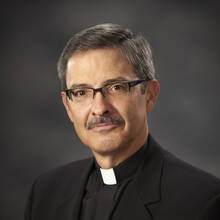Make no mistake, “Fiducia Supplicans: On the Pastoral Meaning of Blessings” advances a carefully crafted “theological reflection” that, as stated in the text, “implies a real development from what has been said about blessings in the Magisterium and the official texts of the Church.” The declaration from the Dicastery for the Doctrine of the Faith broadens and deepens the classical understanding of blessings by offering “a specific and innovative contribution to the pastoral meaning of blessings” (emphasis in original) as specifically applied to “the possibility of blessing couples in irregular situations and same-sex couples without officially validating their status or changing in any way the Church’s perennial teaching on marriage.”
In my opinion, the real development here is that Pope Francis has shifted the focus of the church’s concern from the nature of the relationship itself to the couple involved, by allowing the blessing of same-sex couples without endorsing their unions. (This distinction was reiterated in the press release released by the Dicastery on Jan. 5 “to help clarify the reception of Fiducia Supplicans.”)
That is, the pope refocuses the church’s attention on the pastoral needs of same-sex couples while still advocating for the church’s doctrine of marriage. This turn to pastoral needs is both necessary and welcomed.
The pope refocuses the church’s attention on the pastoral needs of same-sex couples while still advocating for the church’s doctrine of marriage.
We can chart this development through three documents published over the last two years, including “Fiducia Supplicans” itself. In the “Responsum of the Congregation for the Doctrine of the Faith to a Dubium Regarding the Blessing of the Unions of Persons of the Same Sex,” issued in February 2021, the then-Congregation for the Doctrine of the Faith was clear, declaring “illicit any form of blessing that tends to acknowledge [same-sex unions] as such.” It continued, “[T]he blessing would manifest not the intention to entrust such individual persons to the protection and help of God...but to approve and encourage a choice and a way of life that cannot be recognized as objectively ordered to the revealed plans of God.”
The focus of the Congregation is underscored by the title of the responsum itself: “the blessing of the unions of persons” (emphasis added); that is, the unions and not the people involved. And it is highlighted by what some consider the most notorious sentence in the entire responsum: “[God] does not and cannot bless sin.”
The second document is a letter made public on Oct. 2, 2023, in which Pope Francis responded to a dubia letter delivered to him by two cardinals (and supported by three other cardinals), seeking clarification on five doctrinal questions, including the dubium “regarding the affirmation that the widespread practice of blessing same-sex unions is in accordance with Revelation and the Magisterium.” The cardinals asked the pope, “[C]an the Church…accept as a ‘possible good’ objectively sinful situations, such as unions with persons of the same sex, without departing from revealed doctrine?” Note the focus is again on the unions and not the people involved.
“When a blessing is requested, it is expressing a plea to God for help, a supplication to live better.”
As noted in “Fiducia Supplicans,” Pope Francis’ response to the dubium on blessing same-sex unions “provided important clarifications for this reflection and represents a decisive element of the work of the Dicastery.” While acknowledging that the church “has a very clear understanding of marriage...and it is much more than a mere ‘ideal,’” the pope insists that “pastoral prudence must adequately discern whether there are forms of blessing, requested by one or more persons, that do not convey an erroneous conception of marriage. For when a blessing is requested, it is expressing a plea to God for help, a supplication to live better, a trust in a Father who can help us live better.”
Moreover, he insists “in our relationships with people, we must not lose pastoral charity…. The defense of objective truth is not the only expression of this charity.” In speaking of pastoral prudence and charity, Pope Francis is gently guiding the church away from what many consider the dogmatism of his cardinal interlocutors.
The pope finally offers his expansive, pastoral approach concerning blessing individuals in same-sex unions with the declaration “Fiducia Supplicans”: “[W]hen the blessing is requested by a same-sex couple...such a blessing...[is] an expression of the Church’s maternal heart—similar to those that emanate from the core of popular piety—there is no intention to legitimize anything, but rather to open one’s life to God, to ask for his help to live better, and also to invoke the Holy Spirit so that the values of the Gospel may be lived with greater faithfulness” (emphasis added). To critics who argue that this approach contradicts the unchangeable teaching that the church cannot bless sinful acts, Pope Francis’ response is clear and direct: In responding to a request for a blessing by a same-sex couple, the church is blessing them and not their relationship.
Pope Francis can assert in “Fiducia Supplicans” that “God never turns away anyone who approaches him!” and then courageously apply that undeniable truth to same-sex couples who seek God’s blessing through the church. The pope’s courage and compassion in promoting a pastoral approach to this contentious issue in the church is to be heartily applauded.







